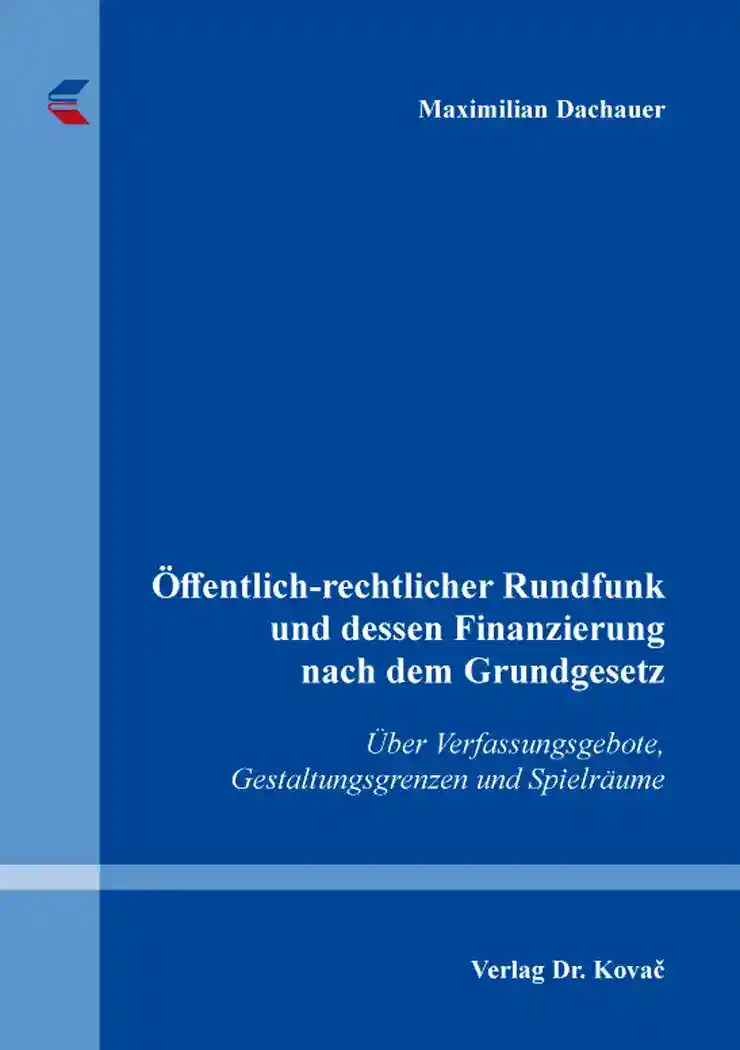Maximilian DachauerÖffentlich-rechtlicher Rundfunk und dessen Finanzierung nach dem Grundgesetz
Über Verfassungsgebote, Gestaltungsgrenzen und Spielräume
Verfassungsrecht in Forschung und Praxis, volume 148
Hamburg 2021, 394 pages
ISBN 978-3-339-12012-0 (print) |ISBN 978-3-339-12013-7 (eBook)
About this book deutschenglish
Is public broadcasting mandatory according to the German constitution? What restrictions must be observed by the legislator regarding public broadcasting committees? Would it be constitutionally permissible to waive the „inevitability“ of the current broadcasting fee with the result that only actual users would be required to pay? This thesis deals with these and other fundamental public media questions, from a constitutional perspective.
The starting point for this thesis is the freedom of media reporting as provided for in Art. 5 para. 1 sentence 2 German constitution (GG). The broadcasting jurisprudence of the Federal Constitutional Court is analyzed and compared to an own approach – a wording oriented interpretation. According to this interpretation, the purpose of the freedom of media reporting as provided by article Art. 5 para. 1 sentence 2 GG is to generate a diversity of reporting by granting everyone the possibility of undertaking their own media reporting. In accordance with the historical legislator, this offers up a broad range of possibilities. The current legislator can stipulate the rules of public broadcasting in its present form, but is not constitutionally obliged to do so.
The technical and financial barriers to the operation of broadcasting, which the Federal Constitutional Court saw in 1961 as the reason for considering public broadcasting a constitutional requirement, are marginalized by the internet. Nevertheless, the Federal Constitutional Court has assumed, most recently in its 15th ruling on broadcasting of 18.07.2018, that the internet, as a relatively new medium, is associated with the danger of a „strengthening of uniform opinions“, which fee-financed public broadcasting faces of against as „counterbalance providing orientation“. The author argues that the internet should be recognized as an opportunity for a diversity of opinions and reporting to find a platform and ultimately to form a basis for the process of free opinion formation. Only the democratically legitimized legislator can decide whether public broadcasting should exist.
The German Constitution is open to a subsidiary public medium according to the concept of the Scientific Advisory Council at the Federal Ministry of Finance, which focuses on objective reporting, culture and education. It would be constitutionally permissible for such a medium to be financed by viewers through a subscription model based on usage. A particular argument in favour of such a model is that the current broadcasting fee represents an equal treatment of essentially unequal payers with regard to their interest in usage. This system requires justification.
Keywords
BerichterstattungBundesverfassungsgerichtFreiheit der BerichterstattungGrundgesetzGrundversorgungsauftragMedienberichterstattungsfreiheitMedienrechtÖffentlich-rechtlicher RundfunkÖffentliches RechtRundfunkbeitragRundfunkgebührenRundfunkrechtsprechungVerfassungsrechtIhr Werk im Verlag Dr. Kovač

Möchten Sie Ihre wissenschaftliche Arbeit publizieren? Erfahren Sie mehr über unsere günstigen Konditionen und unseren Service für Autorinnen und Autoren.
